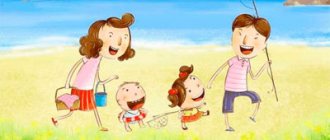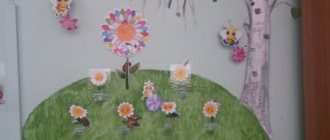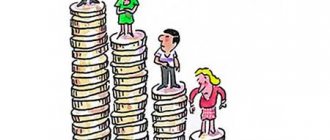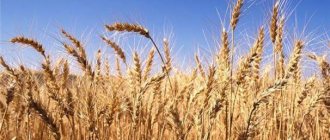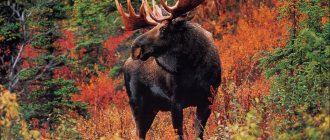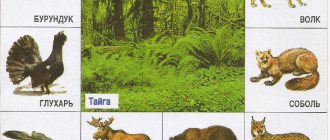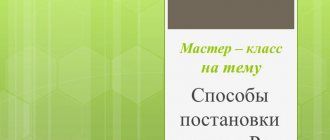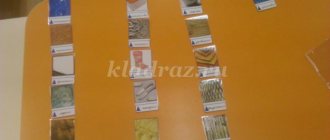Summary of a subgroup speech therapy lesson: “Signs of autumn. Sound and letter A and U"
Summary of a subgroup speech therapy lesson for the preparatory group to consolidate the concepts of sound and the letter A and U, as well as clarify autumn signs.
Goal: to consolidate the concept of sound and the letter A, U, to clarify autumn signs.
Tasks:
- Non-speech - development of general motor skills, development of breathing, development of visual attention, development of thinking, memory, auditory attention, imagination, clarification of knowledge about the sounds A, U, consolidation of grapho-motor skills.
- Speech - to activate and expand the vocabulary, the formation of coherent speech, the formation of relative adjectives, clarification of the names of objects.
- Pedagogical - consolidation of concepts on the lexical topic “Autumn” - autumn signs, clarification of concepts and ideas on the topic “Trees”, development of educational skills, teaching politeness, goodwill, gaming skills, the ability to listen to others.
Equipment:
- colored maple leaves (yellow and orange),
- cards - supporting diagrams with signs of autumn,
- hedgehog made of red cardboard,
- letters A and U made of red cardboard
- envelopes with tree leaves,
- Cardboard trees with leaf silhouettes
- picture of autumn.
Progress of the lesson:
I. Organizational moment. Greetings.
- Today we will go for a walk in the forest. Who can tell me what the forest is like now? (Autumn)
- So, let's imagine that we are walking through the forest. There are tree branches getting in the way under our feet, there is a narrow path, we have to walk carefully. (Children repeat after the speech therapist: raise their legs high, take slow steps - leg to leg)
- And so we entered the clearing. We've been walking for a long time, we're tired, let's take a deep breath. (Inhale - exhale)
- Well, look what you see in the clearing? (Leaves)
- Let's collect a piece of paper, everyone who took the piece can sit at the desk.
II. Start of the main lesson.
- Tell me, what color are your leaves? (Yellow, orange)
- Why are our leaves yellow, orange, and not green? (Autumn has come)
—What do we call this autumn, when the leaves turn yellow? (Gold autumn)
— What happens to nature in autumn? Children name the signs of autumn)
—What do you call the time when the leaves fall? (Leaf fall)
- Well done, right!
- Guys, look carefully at the leaves, they are magical! Each one has a letter written on it. Let's sing, let's voice each of our leaves, and a red hedgehog has come to listen to you sing. (Children sing sounds)
- Notice what happens to our mouth when we sing A-A-A-A? (Mouth wide open)
- And when we sing U-U-U-U, what do our lips do? (Pulled out with a tube)
- Well done! The hedgehog really liked the way you sang the sounds. What are the names of the sounds that can be sung? (Vowels)
- That's right, vowels. We denote vowel sounds in red, just like the hedgehog himself, because these are his sounds. How do we designate sounds in writing? (In letters)
- Let's run our finger over the letter and see how it is written. (The speech therapist shows the children completing the task on their pieces of paper)
- Well done! Everyone has written the letter, and now try to come up with as many words as possible starting with the sound A. (Children come up with words)
- Now as many words as possible with the sound U. (Children come up with words)
- Well done! Now take your leaves and let's go out into our clearing. Stand in a circle, I will speak, and you repeat the movements after me:
The wind blows in our faces, (waving leaves on our faces) The tree swayed, (arms up, tilts to the right - left) The wind is quieter, quieter, quieter, (they lower their hands, squat) And the tree is getting higher, higher. (raise hands, stand up)
- Great! Now take your seats and see what surprise the hedgehog left for us while we were away. (Leaves)
— The trees have shed their leaves. Which tree has shed its leaves? (The speech therapist points to each tree in turn. Oak, maple, rowan, linden)
— What leaves does the oak tree have? (Oak)
- Who has oak leaves? Pick them up and show them off. (Children who have oak leaves pick them up)
— What kind of leaves does the maple tree have? (Maple)
- Who has maple leaves? Pick them up and show them off. (Children who have maple leaves pick them up)
- What kind of leaves does the rowan have? (Rowanaceae)
- Who has rowan leaves? Pick them up and show them off. (Children who have rowan leaves pick them up)
— What kind of leaves does the linden tree have? (Lime)
- Who has linden leaves? Pick them up and show them off. (Children who have linden leaves pick them up)
- Well done! Now put each leaf on its own tree. (Children distribute leaves to the trees)
III. Final part. Summarizing.
- So, today we walked through the autumn forest, let's repeat what we talked about. (About autumn, about the weather in autumn, they named the signs of autumn, picked up leaves, sang the vowel sounds A and U.)
- Well done! Look what a beautiful picture the artist painted. He noted all the signs of autumn that we talked about. Now everyone make up a sentence so that we have a story about autumn. (Each child names a sentence)
- Well done! You did very well today, our walk was very interesting.
Parting.
Nekrasova Nadezhda Pavlovna, speech therapist teacher, GBDOU No. 86, St. Petersburg
- Summary of a speech therapy lesson for children with OHP - Sound [Z], [Z] and the letter Z
- Speech therapy lesson notes [Sound and letter Ш]
- Summary of frontal speech therapy lesson [Sound and letter B]
- Lesson summary “Sound and letter L”
- Summary of a literacy lesson for children in the preparatory school group “Sound and letter Y”
( 3 liked, average score: 5.00 out of 5)
Loading...
Synopsis of a frontal correctional and developmental lesson on the topic “Autumn”
The outline of a frontal correctional and developmental speech therapy lesson is aimed at activating the vocabulary on the topic “Autumn” in preschool children with OPD.
Correctional educational task:
- systematize children’s knowledge about autumn and autumn phenomena;
- activate the verb dictionary on this topic;
- continue to learn how to make sentences based on pictures, and from them a short story;
- continue to teach children to answer questions in complete sentences;
- continue to learn to coordinate movements with speech.
Corrective and developmental task:
- develop fine motor skills of the fingers through finger exercises;
- continue to develop memory and thinking through games and exercises.
Corrective educational task:
- cultivate a positive attitude towards the lesson, independence, control over one’s own speech.
Equipment: presentation, autumn leaves, music “Sounds of the autumn forest”, ball.
Preliminary work: reading poems about autumn by F. I. Tyutchev, A. K. Tolstoy, P. M. Pleshcheev, A. S. Pushkin. Learning poems about the autumn months.
Progress of the lesson
1. Organizational moment
Speech therapist: Guys, say hello to our guests. Today we have an unusual activity, we will travel with you! Guess what time of year we'll go?
I bring in the harvests, I sow the fields again, I send the birds south, I strip the trees, But I don’t touch the pines and fir trees. I... (autumn)
Speech therapist: That's right, we're going to Autumn.
The music of the autumn forest sounds.
2. Game “Autumn Piggy Bank”.
Speech therapist:
— What autumn months do you know? (September October November).
- Tell poems about autumn (Children recite poems about the autumn months).
The collective farm garden is empty, Cobwebs are flying into the distance, And cranes have flocked to the southern edge of the earth. The doors of the schools opened... What month has it come to us?
The face of nature is becoming increasingly gloomy, the vegetable gardens have turned black, the forests are becoming bare, the bird voices have fallen silent. The bear fell into hibernation... What month did it come to us?
The field became black and white. It's raining, then snow, and it's also getting colder, and the waters of the rivers are frozen in ice. The winter rye is freezing in the field... What month is it, tell me?
Speech therapist:
— Guys, what autumn signs do you know?
- The sky is covered with clouds. The sun peeks out from behind the clouds less and less.
- An angry north wind is blowing.
- It often rains coldly.
- The leaves on the trees turn yellow, red, and fall off.
- Leaves cover the ground with a colorful carpet.
- Birds fly away to warmer regions.
- People are harvesting.
- Mushrooms and berries appeared in the forest.
3. Game “Pick up the action”.
Speech therapist:
— Guys, you said that the wind often blows in autumn. Today it has been blowing since the very morning, I met him on the way to kindergarten, and he gave me a magic ball.
The autumn and magical ball will jump into your hands and ask questions.
Speech therapist:
- Guys, let's go to the autumn meadow and play a game. To whom I throw the ball, he answers the question, and for the correct answer I will give you an autumn leaf.
Leaves in autumn (what do they do?) - Leaves turn yellow in autumn, fall off, etc. Rain in autumn - Rain in autumn drizzles, falls, etc. Harvest in autumn - Harvest is harvested in autumn. Birds in autumn - Birds fly away in autumn. Trees in autumn - Trees shed leaves in autumn. Animals in the fall - Animals in the fall prepare for winter, change their coats.
4. Breathing exercises
Speech therapist:
- Take the leaf that you like best and gently blow on it. Now let’s blow on the leaves with force.
We perform breathing exercises.
This is the kind of leaf fall we have.
5. Game “Autumn Leaves”.
Children with pieces of paper in their hands stand in a circle and recite a poem together with the teacher.
Leaf fall, leaf fall, (leaves in hand, waves alternately with both hands) Yellow leaves are flying, rustling underfoot (crouching, throwing leaves on the floor) And flying, flying, flying...
6. Finger game “Autumn Bouquet”.
Speech therapist:
- Guys, let's collect an autumn bouquet.
Children say in chorus: One, two, three, four, five - Let's collect leaves. (Clench and unclench your fists). Birch leaves. Rowan leaves, poplar leaves, aspen leaves, oak leaves (bend your fingers one by one). We will collect an autumn bouquet in a vase. (Clench and unclench your fists).
7. Retelling the story using pictures.
Speech therapist:
- Listen to the story and try to retell it using the pictures.
"Autumn"
Autumn has come. The sun is weakly warm. Strong wind blows. Gray clouds are floating across the sky. It often rains coldly. The wind tears yellow leaves from the trees. Leaves cover the ground with a colorful carpet. Birds fly south.
Retelling the story.
8. A moment of relaxation.
Speech therapist:
- Now let's rest. Lie down on a yellow autumn meadow, close your eyes, relax.
The children are lying “in the clearing”, the speech therapist is reading a poem.
“In Autumn” (A. Pleshcheeva)
Autumn has arrived. The flowers have dried up, And the bare bushes look sad. The grass in the meadows withers and turns yellow, Only the winter in the fields turns green. A cloud covers the sky, the sun does not shine; The wind howls in the field; The rain is drizzling. The waters of the fast stream began to rustle, the birds flew away to warmer lands.
Calm music sounds.
9. Summary of the lesson.
Speech therapist:
— The lesson has come to an end, tell me, what time of year did we talk about during the lesson? What happens only in autumn?
| Transition Valentina Vladimirovna, teacher-speech therapist, MBDOU Volokonovsky combined kindergarten No. 1 “Berezka” Volokonovsky district, Belgorod region |
- Speech therapist assignments on the topic [Autumn]
- Summary of a lesson on the development of coherent speech, topic [Autumn], senior preschool age
- Homework on the lexical topic “Autumn” for children in the senior speech therapy group
- Summary of individual correctional and developmental lesson: Sound production [Ш]
- Information for parents of the preparatory group on the lexical topic “Golden Autumn”
( 4 liked, average score: 5.00 out of 5)
Loading...
Summary of a speech therapy lesson in a preparatory group on the topic: Autumn
Abstract of a speech therapy lesson in the preparatory group “Autumn Walk”
Author of the work: Svetlana Mikhailovna Radulova, speech therapist teacher, Municipal Educational Institution “Bendery Kindergarten No. 9”, Bendery Description of the work: a lesson summary was developed for the preparatory speech therapy group using oral folk art. This material will be useful for educators and speech therapists in working with preschoolers to familiarize themselves with small genres of oral folk art. Goal: to consolidate children’s knowledge about autumn using oral folk art. Correctional educational tasks: Expand and clarify vocabulary on the topics “Autumn”, “Vegetables”, “Fruits”. Improve the skills of forming relative adjectives, agreeing nouns with adjectives and numerals. Improve the skills of syllabic, sound analysis and word synthesis. Improve sentence reading skills. Improve your ability to solve puzzles. Correction and developmental tasks: Develop articulatory, fine and gross motor skills. Develop the duration and smoothness of speech exhalation. Develop auditory and visual attention. Develop abstract thinking. To develop children’s ability to evaluate their activities, generalize, draw conclusions, and express their opinions. Correctional and educational: To develop skills of mutual understanding, cooperation, initiative, and independence. Cultivate interest in folk nursery rhymes, proverbs and sayings, riddles Equipment: basket with vegetables, fruits, leaves, cones, chestnuts, viburnum, rose hips;
music by P. I. Tchaikovsky “October”; autumn leaves with printed proverbs, drawings - answers to riddles: fog, autumn, leaf, rain; flat images of vegetables, three baskets, fruits: pears, apples, plums, cherries, apples with puzzles, dishes: jars, vases, bottles, glasses according to the number of children, cards with pasted leaves according to the number of children. Progress of the lesson:
1. Organizational moment. “Autumn Song” by P. I. Tchaikovsky is playing. The speech therapist invites the children to join the group.
Speech therapist. Today we will continue the conversation about autumn, vegetables and fruits. The speech therapist shows the children a basket with autumn gifts. Speech therapist. Smell what autumn smells like? Children. Vegetables, fruits, mushrooms, rain, berries, fallen leaves. 2. Exercise “Autumn Leaves”. Speech therapist. In autumn the leaves rustle on the trees. (the hands sway, saying: sha - sho - shu - shi).
Leaves fall to the ground.
(As you inhale, raise your hands up, as you exhale, lower your hands and say: p - p - p)
3. Bioenergoplasty exercises. Children, together with a speech therapist, perform the exercises “Window”, “Smile”, “Tube”, “Speaker”, “Chatterer”, “Swing”. 4. Exercise “Autumn Riddles”. Speech therapist. Guess the autumn riddles, choose a picture - the answer. Children solve riddles by choosing answers from pictures.
She came without paints and without a brush, and repainted all the leaves.
(Autumn). Does anyone know this riddle? - In autumn - a sieve, in spring - a sieve. (Rain). The gray-haired grandfather at the gate covered everyone's eyes. (Fog). It had been hanging on a branch since spring, It was green, but it turned yellow. As soon as a weak wind blew, It already flew away. (Sheet). 5. Exercise “Leaf fall”. On the board are images of yellow, orange leaves with printed unfinished proverbs.
Speech therapist. In autumn leaf fall in the park. Proverbs are written on the autumn leaves, but they are not finished. Read the beginning of the proverbs and say them to the end. Children read unfinished proverbs.
Summer with sheaves,.. (autumn with pies).
Spring rain grows... (and autumn rain rots). Gray morning in autumn... (red day). September smells like apples... (and October smells like cabbage). Autumn is stocky... (winter is stocked up). Autumn is coming - ... (leads the rain behind it). 6. Game “Count the words in the proverb.” Speech therapist. Count how many words are in the proverb “Summer with sheaves, autumn with pies.” Children. There are six words in the proverb. Speech therapist. Name the prepositions. Children. So, s. 7. Game “Yes - no”. Children have cards with different numbers of leaves.
Speech therapist. We will play the game "Yes or no". 1 child. I have two maple leaves. 2nd child. I don't have two maple leaves, but I do have five oak leaves. 3 child. I don't have five oak leaves, but I do have one linden leaf. All children name the number of leaves using cards. 8. Game “Harvest”. The speech therapist places a picture of a vegetable garden and three baskets on a magnetic board.
Speech therapist. In autumn, vegetables are harvested in the gardens. Can we help gardeners harvest their crops? I suggest you remember and make riddles about vegetables, divide the answers into syllables and put them in baskets. Collect vegetables with one syllable in the name of a blue basket, two syllables in a red basket, and three syllables in a green basket. Children complete the task.
Speech therapist. I will clap the rhythm of the word, and you will select the names of vegetables with a given number of syllables. Children complete the task. 9. Dynamic pause. The speech therapist invites children to the carpet to do exercises.
Ru-ro-ra - it's time to pick fruit.
(Children clap their hands.)
Ra-ro-ru - I’ll pick pears.
(They clench and unclench their fists above their heads.)
Rya-ryu-ri - pick the plums.
(Rhythmically extend their arms forward, spreading their fingers, and press them to their chest, clenching their fingers into fists.) 10. Exercise “Collect apples.” The speech therapist places flat images of a basket with apples and a pear on a magnetic board. Speech therapist. In autumn, fruits are harvested in the gardens. The piglets were sleeping quietly in the yard at dawn. In the morning they went to the garden and found apples in the grass. (Russian folk nursery rhyme) Speech therapist. There are puzzles on the apples. Let's solve them. What word is hidden? Children solve puzzles: branch, wind, carpet, bucket.
11. Game “Pick up a scheme.” Speech therapist. Choose a sound scheme for the word “pear”.
12. Game "Cooks". Children have flat images of fruits, jars, bottles, glasses, vases. Speech therapist . What can you make from fruits? Children. Jam, juice, jam, marmalade, mousse, jelly, compote. Speech therapist. We will play the game "Cooks". You choose fruits, put them in a bowl and tell us what dish you prepared.
1 child. I made apple compote. 2nd child. I made quince jam. 3 child. I made some pear juice. Speech therapist. Well done. You have prepared very tasty dishes. 13. End of class. Speech therapist. We were in the autumn park, vegetable garden, orchard. What games and exercises did you like? Who needs to be more attentive, more active? Who did the best?
We recommend watching:
Synopsis of a cognitive-game lesson with children of the preparatory group Synopsis of a lesson on the formation of a civil-patriotic position in children of preparatory group D Synopsis of GCD on speech development in the preparatory group on the topic: GCD professions for teaching literacy in the preparatory group of kindergarten
Similar articles:
Walks in the preparatory group. Card index with goals for October
Walks in the preparatory group. Card index with goals for November
Article:
Correctional educational goals:
- Activation of the dictionary on the lexical topic “Autumn” ;
- Learn to form words with the same root for the word AUTUMN:
- use synonyms;
- Develop skills in writing a short descriptive story;
- Strengthen children's skills in performing syllable analysis and synthesis.
Corrective and developmental goals:
- Reinforce the idea of the characteristic signs of autumn.
- Learning the poem by I. Mikhailova “How offensive” through modeling.
- Activate figurative expressions from poems in children’s speech.
- To develop children’s emotional and aesthetic perception of their native nature in the poetic word, music and visual arts.
Correctional and educational goals:
- Cultivate a feeling of love for native nature.
- Develop teamwork skills.
Equipment: models of a poem, story, computer, music by Tchaikovsky “October” , cards “Autumn” (house, tree, clouds), cards (schemes with 1,2, 3 syllables).
Integration of educational areas:
- Cognition.
- Communication.
- Reading fiction.
Educational technologies used:
- Gaming technology.
- Information and communication technologies.
- Health-saving technology.
Vocabulary work:
Expand predicative (verbs: spin, fly, crumble, fall, etc.) and adverbial (adjectives: late, golden, crimson, bright, etc.) dictionaries.
Activate the vocabulary: leaf fall, golden, capricious, late (autumn), in short azure, gloomy, cloudy (sky), shallow, drizzling (rain), etc.
Preliminary work:
Getting to know Russian poets. Memorizing poems by A.S. Pushkin “Sad time. The charm of the eyes” , A.I. Pleshcheev “In Autumn” , I. Bunin “Forest, like a painted tower” .
Getting to know the signs of autumn.
Drawing on the theme: “Golden Autumn” , application: “Maple in Autumn” Observation of autumn nature, collecting leaves to make an “Autumn Bouquet” .
I. Organizational moment.
Speech therapist teacher: (hereinafter U-L:)
-Hello, guests! Hello children! You need to start every day in a good mood. And to make the mood good and cheerful, let's say hello to you.
Song - greeting HELLO to T. Sikacheva
Hello golden sun! Hands above head, fingers spread in the form of rays
Hello blue sky! Show the sky
Hello, free breeze! Show the breeze (we wave our arms left and right)
Hello, little oak tree! Show oak tree.
Hello, Morning! Gesture right
Hello Day! Gesture left
We are not too lazy to say hello! Hands to the chest, then spread to the sides.
The children sit down.
“The Seasons” sounds October" (slide show on an autumn theme).
Speech therapist teacher: (against the background of quiet music).
Quietly in the silent autumn forest, The leaves are spinning, look at the fly, As if they are sad about the past life, It’s as if “goodbye” .
The air is transparent, clean and fragrant, the leaves lie like a multi-colored carpet. A late autumn flower cheers, a transparent stream murmurs peacefully,
The songbirds are ready to fly away, The toiling woodpecker is hammering the trees, The oak tree is dropping acorns and rustling, The maple tree is burning red.
And I want to see everything without end - a picture worthy of the creator’s brush. Lush willows bent towards the water, Yellow braids rinse in the water.
U-L: Look how bright and beautiful everything has become. The hall was filled with colors. Are you in a happy mood? (children's answers) That's good.
II. Main part.
Guys, I’ll tell you a riddle now, and you listen carefully...
I bring the harvest, I sow the fields again, I send the birds south, I strip the trees,
But I don’t touch the pines and fir trees. I...... (Autumn)
-Yes, it really is autumn. Autumn is an amazing, charming time of year. It pleases us with an abundance of colors and lush decoration. There are many beautiful words that can be said about autumn. What words do you know about autumn?
The game is played: “Word on the palm” . What is autumn?
— Many poets loved this time of year and sang it in their poems. Who knows poems about autumn? (children read poetry, name the author). What words and expressions did you especially like in these verses?
— Guys, autumn is not only a beautiful time of year, but also a little sad. I suggest you listen to I. Mikhailova’s poem “How offensive”:
Autumn with a long thin brush Repaints the leaves Red, yellow, gold How beautiful are you carved leaves
And the wind puffed out its thick cheeks, puffed up, puffed up And blew, blew, blew onto the colorful trees Red, yellow, golden The whole colored leaf flew around!
How insulting, how insulting... There are no leaves, only branches are visible.
Questions for children:
—What autumn phenomenon are we talking about in this poem?
— What colors did autumn repaint the leaves in the poem.
—What was the beauty of autumn? (suggest repeating lines from the text)
- Show me how the wind puffed out your cheeks.
Let's show how the wind blew on the trees. Red, yellow, gold Flowed around the entire colored sheet! How offensive, how offensive... (show how offensive it is to you)
There are no leaves, only branches are visible.
- We have already said a lot of beautiful words about autumn. Guys, let's make up new words with the word autumn. (N.: autumn rains, autumn morning, autumn clothes, etc.)
Physical exercise “Falling leaves” . Children "turn into leaves"
A strong wind suddenly blew (the children exhale)
And quickly blew off the leaves (take a long exhale)
All the leaves flew (alternating inhalation and exhalation, pronouncing the sound “sh-sh-sh” , with arms raised up, lean to the right, left)
And they sat quietly on the ground (alternating inhalation and exhalation, pronouncing the sound “sh-sh-sh” , lowering their arms, squatting).
Turn left, right (circle smoothly)
And turn into kids.
— And there is also one game “say it differently . What is the sky like in autumn?
— What kind of trees are they in autumn?
— In autumn the birds don’t have enough.
Finger gymnastics:
The hedgehog stomped along the path Children take turns bending their fingers first
And he carried mushrooms in a basket. on the left, then on the right hand. At the end
To count mushrooms, they must have hand exercises
You need to bend your fingers. clenched into fists. Rep. exercise several times.
Syllable analysis and synthesis “autumn”
The speech therapist gives cards to the children. Some depict pictures, the words of which have one, two, three, four syllables, and others “bricks” indicating the number of syllables (based on the theme “Autumn” ).
You need to select a card for each picture according to the number of syllables.
- Well done, you performed the exercise correctly.
III. Organization of the end of the lesson.
Summarizing. Farewell to children
